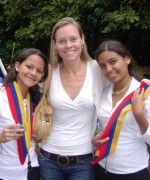Column Name
Title
Anne Fitzgibbon studied clarinet with Stanley Drucker through the Juilliard-Barnard-Columbia Exchange program (from 1989-91), graduated from Barnard, completed a master’s degree in public affairs and urban and regional planning at Princeton, and worked for five years as a policy advisor for Mayors Bloomberg and Giuliani. These diverse experiences intersect in her current role as executive director of the Harmony Program, which she founded to provide music lessons and ensemble experience to economically disadvantaged children in New York City.
Body
Modeled after Venezuela’s renowned El Sistema music education program, Harmony fosters a familial community for students and their parents while emphasizing the influence of studying music on social development. And while it provides an intense, daily musical experience, it also “creates a safe space for these kids that is also about fun,” Fitzgibbon recently told The Journal.
Though Harmony now serves 100 kids at three sites in Brooklyn and Manhattan, Fitzgibbon, 40, created it in 2003 as a small, private project while she was working on educational policy. “I was reading about how public schools don’t have instrumental music programs anymore, which reminded me of how I had been at school with so many talented musicians—we all could have been donating our talents to teach kids who need music,” she said. “I’d tutored reading, math, and G.E.D. prep in Harlem, and so I thought, why not music?”
Using jazz students from the New School as teachers, Fitzgibbon assembled low-income public school children from all five boroughs for weekly musical instruction. The successful pilot showed her that these services were greatly in demand and convinced her, a year later, to incorporate Harmony as a nonprofit and quit her city job, a move she describes as “jumping off a cliff.”
But while Harmony was undoubtedly doing important work and growing, Fitzgibbon knew there it could have even more of an impact. In 2007, she went to Venezuela on a Fulbright scholarship to study El Sistema for a year. “My whole purpose in going there was to see the amazing things they were doing, gain some insights into why they were so successful, and then bring those lessons back and incorporate them into the Harmony program,” she said. “With my new perspective, I changed almost everything when I got back.”
Fitzgibbon’s first step was to partner with the City College of New York. Not only could she draw from the huge system’s student body for teachers, Fitzgibbon said, but she could also “use their campuses as my nucleos, my centers, as they call them in Venezuela, to create my own Sistema. They also have a public mission, a history of educating people who haven’t had opportunities before, so my mission seemed to mesh nicely with their priorities.”
She also set up daily Harmony after-school programs that emphasize musical instruction as well as trust, relationships, skill-building, and social development. This objective compels us “to reconsider, to broaden our definition, of what a music educator can do and the impact we can have on these kids,” she said.
“I don’t say that these kids need to be the next child prodigies. Instead, I think of the benefits that music holds for them,” Fitzgibbon added. “It’s about teaching them discipline and commitment. Instead of getting frustrated and giving up, music teaches them that persistence gets you somewhere, and that’s a great lesson to learn.”
In addition to instrumental instruction, students in the Harmony Program are also exposed to ensemble playing at a very early age. “It’s all about social and life skills through music, so many of which are developed through making music with their peers,” Fitzgibbon said. “They have to listen and collaborate, learn their individual roles, and respect organization and structure.”
But even while these young musicians are learning new skills, both musical and social, a key element is enjoyment. “We often forget in the United States, it’s supposed to be fun!” Fitzgibbon said. “People were so skeptical at first. They said I would never get kids to come every day. My argument is that—just like they want to play video games, baseball, and everything else—if you make it fun, they’ll want to do it.”
The Harmony Program is now in three schools and community centers around New York, including a Saturday orchestra program in Brooklyn. And the program’s reach—and that of the Sistema movement in general—are continuing to expand. There is a worldwide network of organizations dedicated to the same mission, and many others are trying to get off the ground. “What I love about this whole movement is that it’s inspiring so many people,” Fitzgibbon said. “Really, anybody can make a difference, even one person, with one hour a week. You can have an impact. You can do something. I always tell people, ‘Don’t be scared. Be bold.’”





